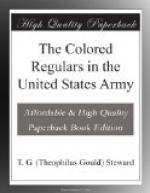Likewise when the Twenty-fifth Infantry arrived at its station at Fort Logan, Colorado, the people of Denver gave to both officers and men a most cordial reception, and invited them at once to take part in their fall carnival. All over the country there was at that time an unusual degree of good feeling toward the colored soldier who had fought so well, and no one seemed to begrudge him the rest which came to him or the honors bestowed upon him.
This state of feeling did not last. Before the year closed assiduous efforts were made to poison the public mind toward the black soldier, and history can but record that these efforts were too successful. The three hundred colored officers became an object at which both prejudice and jealousy could strike; but to reach them the reputation of the entire colored contingent must be assailed. This was done with such vehemence and persistency that by the opening of 1899 the good name of the black regular was hidden under the rubbish of reports of misconduct. So much had been said and done, even in Denver, which had poured out its welcome words to the heroes of El Caney, that the Ministerial Alliance of that city, on February 6, 1899, found it necessary to take up the subject, and that body expressed itself in the unanimous adoption of the following resolutions:
RESOLUTIONS ADOPTED
UNANIMOUSLY BY THE MINISTERIAL ALLIANCE
OF DENVER, FEBRUARY
6, 1899.
Resolved, By the Ministerial Alliance of the City of Denver, that the attempt made in certain quarters to have the Twenty-fifth Regiment, United States Infantry, removed from Fort Logan, appears to this body to rest on no just grounds, to be animated on the contrary by motives unworthy and discreditable to Denver and the State, and that especially in view of the heroic record of the Twenty-fifth Regiment, its presence here is an honor to Denver and Colorado, which this Alliance would regret to have withdrawn.[24]
The mustering out of the volunteers about the time this opposition was approaching what appeared to be a climax, causing the removal from the service of the colored officers, appeased the wrath of the demon, and the waves of the storm gradually sank to a peace, gratifying, indeed, to those who shuddered to see a black man with shoulder-straps. As the last Negro officer descended from the platform and honorably laid aside his sword to take his place as a citizen of the Republic, or a private in her armies, that class of our citizenship breathed a sigh of relief. What mattered it to them whether justice were done; whether the army were weakened; whether individuals were wronged; they were relieved from seeing Negroes in officers’ uniforms, and that to them is a most gracious portion. The discharge of the volunteers was to them the triumph of their prejudices, and in it they took great comfort, although as a matter of fact it was a plain national movement coming about as a logical sequence, entirely independent of their whims or wishes. The injustice to the Negro officer does not lie in his being mustered out of the volunteer service, but in the failure to provide for a recognition of his valor in the nation’s permanent military establishment.




